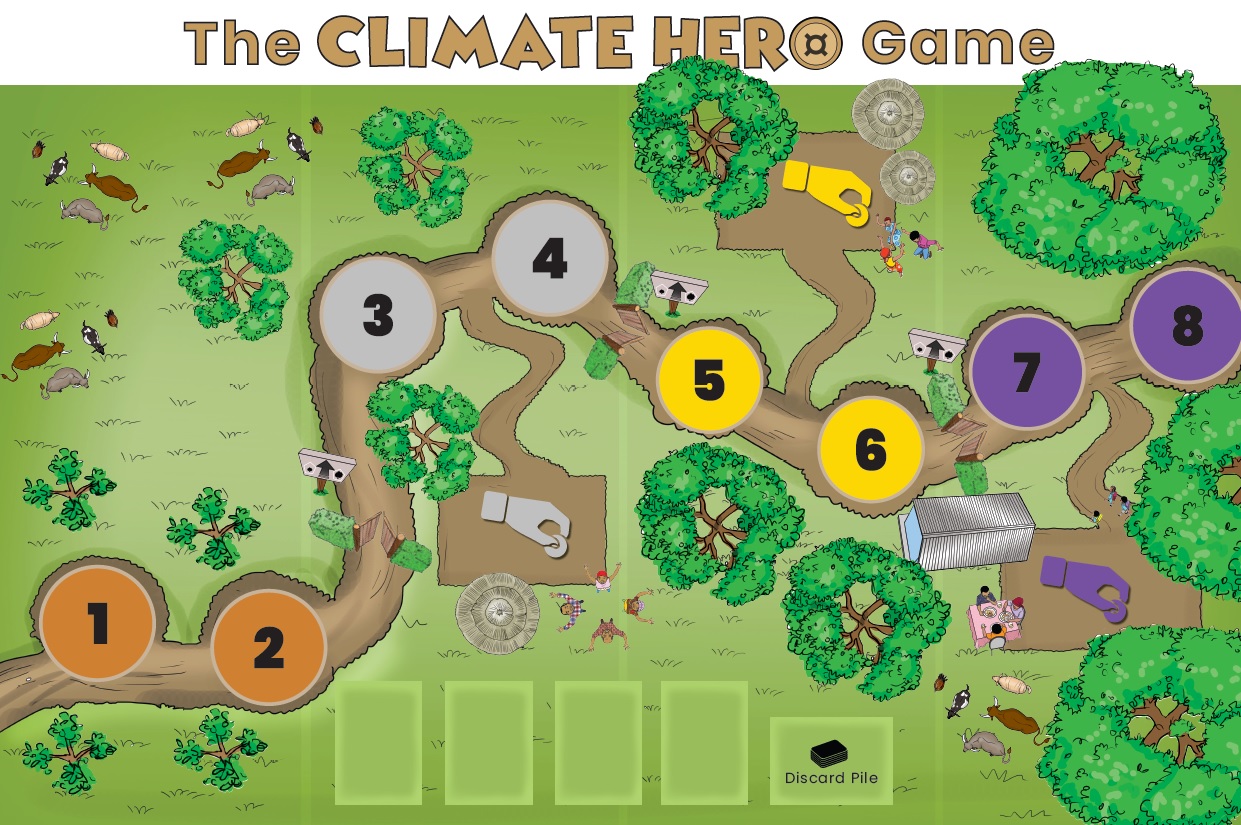One of Solidaridad’s goals is to make sure that carbon markets and low-carbon agriculture work in favor of smallholders. This is the purpose of the Climate Heroes Dream Fund, an initiative that facilitates building farmer resilience to climate change and provides incentive payments to producers who generate Carbon Removal Units (CRUs) through agroforestry, launched in Nicaragua, Uganda, Kenya and Colombia.
Small-scale farmers cultivate a crop, such as coffee or cocoa, and plant shade trees at the same time to improve their farm and to sequester carbon. The CRUs they generate can then be traded through the ACORN platform, a global carbon marketplace developed by Rabobank, which guarantees low transaction costs and high carbon prices for farmers. With the support of Solidaridad and its partners, and with the incentives offered by ACORN, small farmers are thus able to become Climate Heroes, people whose actions are helping to tackle the great challenge of our time.
Within the Climate Heroes programme the goal is to reach 100,000 farmers in the 4 countries, allowing them to sell carbon credits generated by introducing agroforestry. Apart from the technical challenges of any agroforestry programme, Climate Heroes faces the twin challenge of motivating farmers and, once that’s been successful, keeping them on board for what is inevitably a lengthy process. This means that even though those who join the programme are highly motivated, continuity in the long term remains a challenge.
Continuity is a challenge
During the programme, farmers receive support and advice from experts. But once the training period ends, there is a long wait before the project activities turn into clear results. On average it will take 2-3 years after planting the trees before farmers will see a return on their investments. Meanwhile, farmers need to keep the trees alive and flourishing for a long time in order to experience benefits such as fruits, food and medicinal plants from the trees and to get paid for their carbon sink effect. During that period they have to overcome obstacles that can challenge the motivation of even the most committed farmer. When farmers face drought and pest problems, or receive new incentives from major buyers to grow more on their land, the long-term math may fall victim to the short-term reality. If farmers do not plant trees, or fail to keep them alive, they will miss out on the opportunity to increase their income by 10-50% and make their farm more climate resilient and productive.
So while the benefits of agroforestry, both environmentally and financially, are scientifically founded and explained to participants, this long waiting period, coupled with the challenges of implementation, makes farmer drop-out in this waiting period a real risk.
“We design programmes that bring real benefit to small farmers,” says Eduard Merger, Climate Innovation Lead and Business Developer at Solidaridad. “But even though Solidaridad can provide support, the majority of the work needs to be done by the farmers themselves. This is an investment that only pays off later, after 3 years or longer. Due to frequent short-term challenges, farmers can find it difficult to keep up the hard work of managing their seedlings to maturity, or even planting them in the first place.”
Without the long-term support of these farmers, Climate Heroes cannot be successful. Keeping them motivated, and preventing drop-outs, is therefore key.
That’s why Solidaridad teamed up with &ranj to develop a system aimed at doing just this.
Creating a lasting impact can be as simple as playing a game
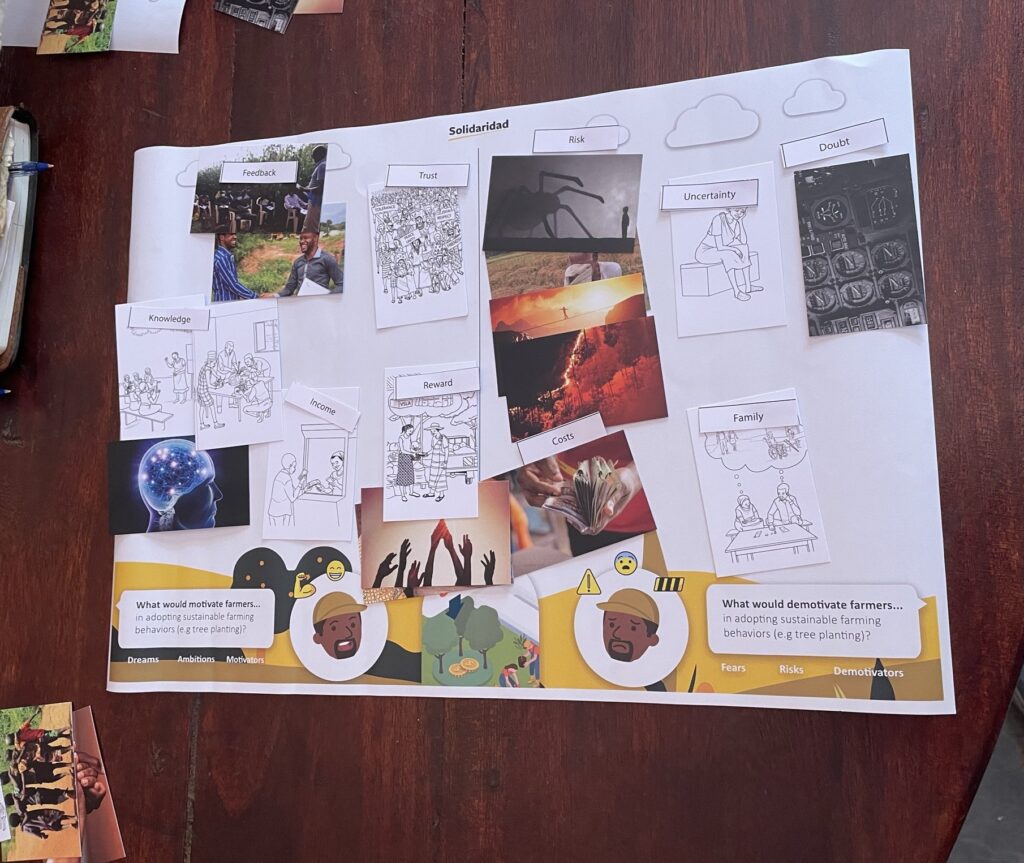
&ranj is a gamifications expert, designing and producing game-based solutions to create behavioral change. Solidaridad was inspired by their involvement with War Child’s Can’t Wait to Learn programme. In this programme researchers, educational experts, local designers and writers worked together with the programmers and game designers of &ranj to develop games for children affected by war situations. We decided to invite them to join the Climate Heroes programme. Within the programme &ranj had been tasked with developing a motivational system for farmers to help them deal with the challenge of becoming a Climate Hero.
Their interventions are based on psychology, explains Ellemieke Berings of &ranj: “To facilitate behavioral change, you need to first understand what is driving or holding back people to display the desired behavior. You need to understand people’s dreams, fears, needs, social structure etc. Desk research and weeks of co-creation helped to narrow down our focus.”
This process, based on identifying the deep roots of a local situation, and addressing issues there to encourage systemic change, is often compared to the growth of a tree by &ranj.
“First, it needs to be clear for farmers how something as intangible, impersonal and technical as carbon could positively impact their lives and the lives of their children. Also a lack of local agency has to be overcome. Shifting a mindset from farmers being ‘recipients of aid’ to ‘owners of change’. Facilitating ownership and social support within local communities appeared to be critical,” says Frank Stemerding of how &ranj uses gamification to get over these hurdles.
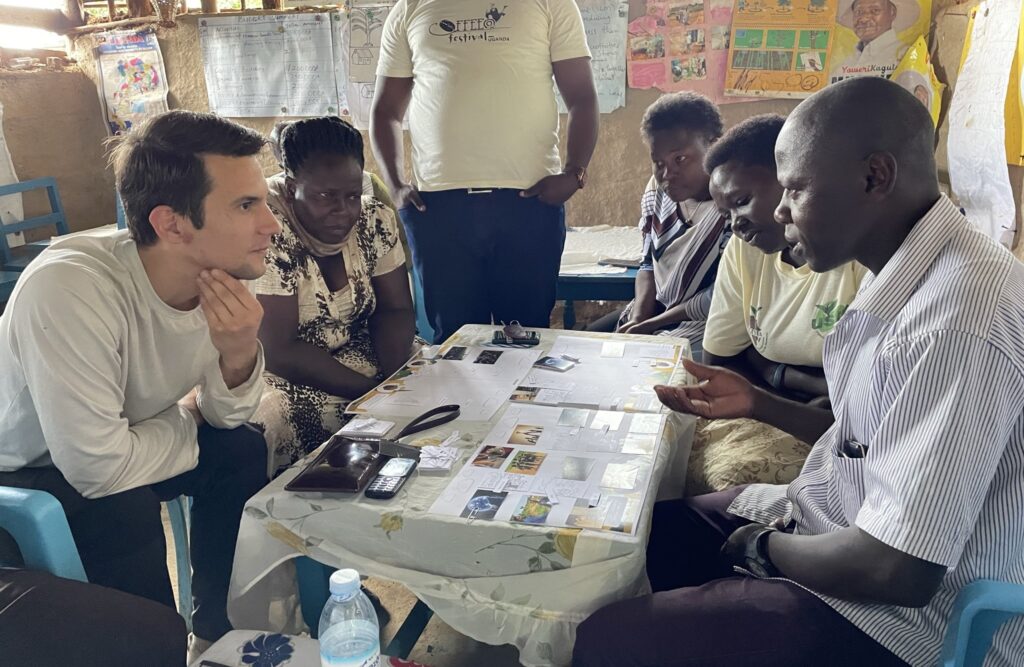
Creating these games could not happen from an office in another country. To ensure that these games spoke to the interests and priorities of the farmers themselves, &ranj interviewed and joined a farming community in Uganda. There they learned from interaction with the farmers themselves that they were driven by the relationships they had with their peers, and how these related to their social status and community. With this knowledge, &ranj developed the Climate Heroes Game and the Money Trees Savings (MTS) League in the community.
The games
The Climate Heroes Game helps players understand the long-term benefits of taking part in the Climate Heroes project, without having to wait three years. Players will see that their production quality and yield improve and that it is a way to mitigate risks and threats in the livelihood of the farmers. The game shows the growth of the so-called Money Trees, which represents the increasing financial value over time and it gives them tips on how to plant and nurture these Money Trees.
To win the game teams of farmers need to plant Money Trees on the ‘Garden Board’. By rolling the dice and going through a series of different challenges, the farmers experience years of tree maintenance in half an hour of playing the game. Throughout the game, teams progress through time phases, witnessing their trees grow and increasing in value. The team with the most coins at the end of the last phase are the “Climate Heroes” and they will receive the “Money Tree Trophy.”
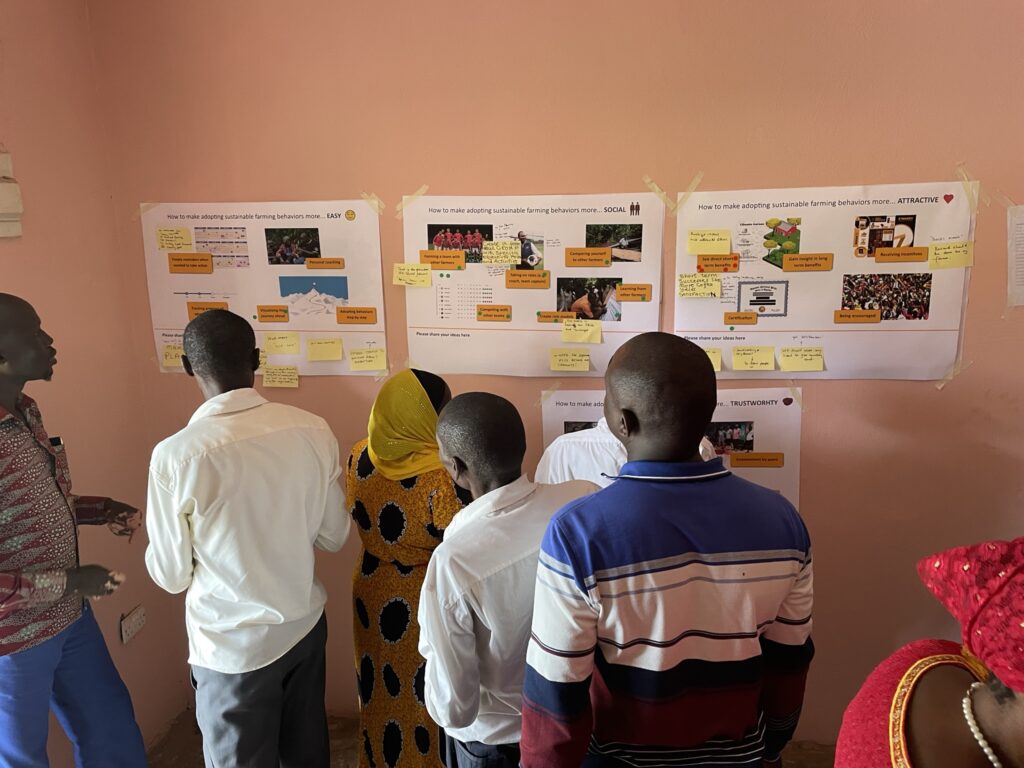
&ranj’s research showed that playing the game needs to be embedded into the social fabric of a community to have results. A single board game session cannot sustain behavioral change. That is where the The Money Tree Saving (MTS) League comes into play. The key to the MTS League game is that it needs to be part of an already vital part of the local farming community, whether it be the meeting of the Farming Cooperative, a VSLA or even a Church group. From the first moment that a farm group comes together and determines their personal and team goal, they are participating in the MTS leagues. From then on, the farmers can use the MTS garden board to update their progress every time they are meeting collectively at the chosen social event.
MTS League serves as a social support system that unites farmers in their progression, introducing elements of friendly competition and cooperation. Seeing their results helps farmers become more motivated to reach their personal goals. It also allows them to see when their friends and colleagues are falling behind, creating opportunities for them to help each other out, to support with planting, nurturing and managing their shade trees. When multiple farm groups are participating, they can exchange knowledge on how to plant and nurture these Money Trees to invest in a better future, through local cooperation. “Together we can bite through the toughest bones”, as a local saying on teamwork goes.
Results that speak for themselves
After taking part in the Climate Heroes game for the first time, 88% of farmers felt motivated for the Climate Heroes programme, compared to just 49% beforehand. 96% of farmers said they understood the benefits of the programme compared to 68% before. With the MTS League we see a similar trend, with 98% of farmers now feeling excited by the challenge of the programme, compared to just 27% before, specifically because they would be in competition and cooperation with their peers. As one participating farmer put it: “Farmers don’t work in isolation, we always share with our neighbors.”
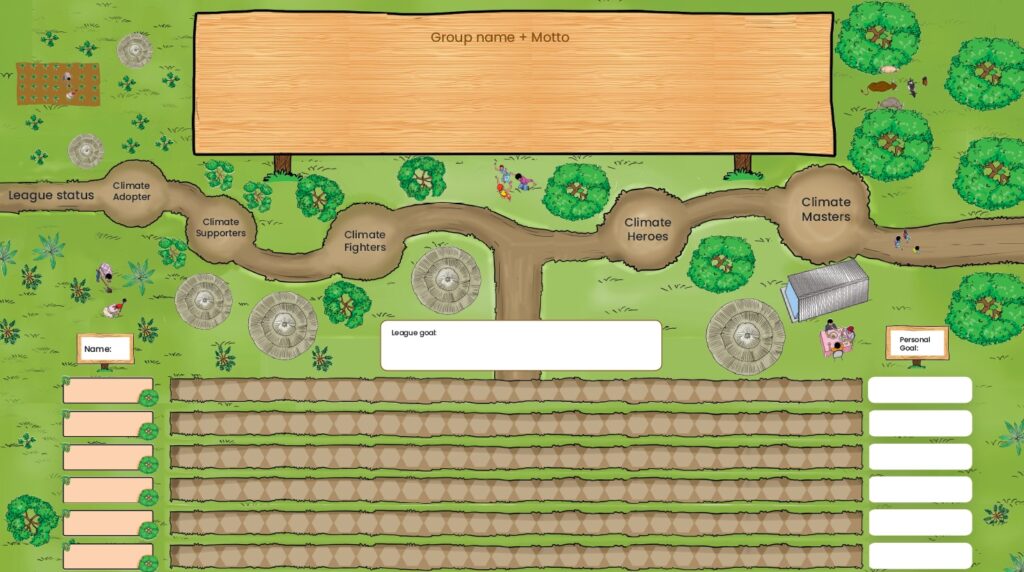
This shows that well designed gamification can make the meaning of a programme tangible, as we saw with the Climate Heroes Board Game, which allowed the participating farmers to visualize the programme’s long-term impact in a few short minutes. Games can also help foster the crucial sense of ownership and accomplishment by leveraging existing community structures.
Next Round?
The initial results of our experiment with &ranj are very positive, but this is just a starting point. There are 100k+ smallholder coffee farmers in Uganda, Colombia, Kenya and Nicaragua taking part in the Climate Heroes programme. Already the lessons we learned from this programme are being translated into action in Nicaragua and Colombia where, based on co-creation workshops with participating farmers, the games are being adapted. Step by careful step we hope to introduce this solution to each participating context in the Climate Heroes programme.
Each of these countries is also made up of different contexts, different communities and none of them will be inspired by the exact same game as was developed for the Ugandan communities involved. &ranj’s method is not based on a one-size-fits-all solution, instead it is about developing something appropriate for each community. The Climate Heroes Game and the Money Trees Savings League offer a template, but it will be crucial to make them fit the culture and community in which they are played.
The long-term impact of this intervention will be the focus of a study by Maastricht University in the coming years, ensuring that we can leverage this pilot to help create change not just in this programme, but in other crucial projects taking place around the world. We will continue to monitor the implementation of this games-based solution and will support the success of these farmers in their crucial role in this global challenge.That is not a roll of the dice.

